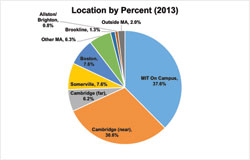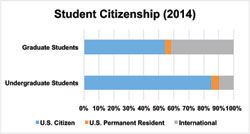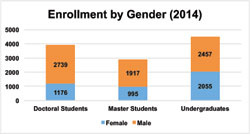
| Vol.
XXVII No.
4 March / April 2015 |
| contents |
| Printable Version |
Graduate Student Perspective on the ICEO Report
The Institute Community and Equity Officer report is a comprehensive document that identifies a broad spectrum of issues and prioritizations across the 26,400 person MIT community. From 1980-present, the graduate student body with approximately 6,800 people is the single largest demographic of the MIT community outnumbering the approximately 4,500 and 1,000 undergraduates and faculty, respectively [MIT Facts FY 2015 (web.mit.edu/facts/enrollment.html)].
The issues (gender, geographic, socio-economic, etc.) faced by graduate students, can be better understood by having a clearer picture of the demographic in context to students (graduate and undergraduate). The Graduate Student Council (GSC) views a graduate student as someone pursuing advanced studies (professional or graduate degree), who has representation across all departments, residence halls, and at large. The graduate student body is 60% (4080) domestic and 40% (2720) international (Figure 1a) where 60% are single, 30% have a significant other, and 10% have a dependent(s). This more heavily male population (Figure 1b) has a 90% concentration between the ages of 22-30 (mean of 25). The majority of their time is spent in the research lab or on campus, and most prefer and live (68-76%) in close proximity to campus (Figure 1c), with the largest percentage increase from 2003-2013 being Cambridge (near). Graduate students are extremely price sensitive, with an approximate stipend of $35,000 with 50-58% going to housing (rent, utilities, and local transportation). This largest demographic of the MIT community affects MIT’s sense of community, research productivity, and competitive edge.

The report has many recommendations that resonate with the graduate community, with these being the top three:
- The C1 recommendation for the community-wide Task Force on the MIT Compact (TFMC) should ideally have proportional representation based on MIT’s population, due to the many MIT community stakeholders. The additional question of “What do we want out of our MIT experience?” should be added.
- The report’s recommendation for uniform medical, health, and wellness resources for the MIT community is strongly supported by graduate students. There are several areas where graduate student resources need improvement. Funded graduate students have covered health insurance, but non-funded graduate students and family members do not. The graduate dental coverage is not adequate, and access to the employee/postdoc plan should be permitted. Graduate students with family member(s), especially those international, are the most in need of additional support. A need-based grant proposal is being developed by the GSC and ODGE (Office of the Dean for Graduate Education), and some peer intuitions have a funded program. The Massachusetts Commission Against Discrimination (MCAD) policy of gender-neutral parental leave that took effect this April 7 should apply to students. Many of these efforts need faculty support, and fundraising or endowments should be part of MIT’s capital campaign.
- The recommendations on awareness, assessment, feedback, and development of creative activities should leverage existing resources and channels to expand them where appropriate. The GSC and ODGE consolidating graduate student’s rights and responsibilities into a single document can be a starting point for awareness. A formal mechanism, potentially an Institute Committee on Health and Wellness, can help assess and establish an appropriate interface for student’s concerns. The DSL, GSC, UA (Undergraduate Association), and housemasters are developing a streamlined process for student policy review, and the lessons learned could be applied to other MIT policies. The GSC is a central hub that provides funds and information to the graduate student body, and should be leveraged to spark engagement, publicize relevant information, and expand the existing funding conduits. Existing programs oversubscribed and highly recommended by students, for example conflict management training, should be expanded. Students would like to see the ICEO, faculty, and senior leadership promote and recognize those that get involved in these activities on a non-periodic basis.
There are many more recommendations the ICEO report makes that can benefit the MIT community and bring about positive change. The GSC would like to thank Professor Bertschinger for his continual improvement of the MIT community.
| Back to top | |
| Send your comments |
| home this issue archives editorial board contact us faculty website |

